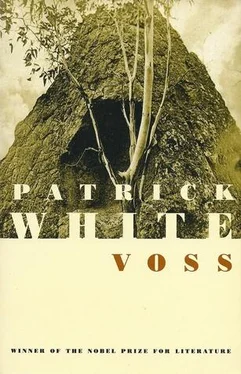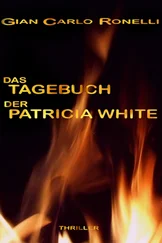When the two aboriginals had brought in the hobbled horses, which had struggled back as always in the direction from which they had come, it did not take long to prepare for departure. Only Colonel Hebden himself gave one last look to westward, and at those inhospitable rocks in the near distance. Perhaps the fact that they were the only feature in the landscape made them most terrible.
So the expedition turned back.
That he had failed, was, of course, obvious to the Colonel, but he did not altogether blame himself. He blamed the boy Jackie, who had become, because of his elusiveness, the key to all secrets. Trailing back with his party in the direction of Jildra, Colonel Hebden’s private resolve was eventually to find Jackie, or to ‘apprehend’, as he noted that night in his journal.
He remained unsatisfied, however. If he had but known — there was a great deal that Colonel Hebden did not know; it was almost as if there had been a conspiracy against him — if he had but known, Death had just apprehended Jackie, crossing a swamp, during a thunderstorm, at dusk. The boy had not attempted to resist. He lay down, and was persuaded to melt at last into the accommodating earth, all but his smile, which his tight, white, excellent teeth showed every sign of perpetuating.
IN the absence of its present owners, the Parburys, on a pleasure voyage to Europe, the Radclyffes had taken the old house for at least six months, so that the children might benefit by the sea air and their mother enjoy such distractions as Sydney had to offer. So the whole household was transplanted — maids, nurses, governesses, a selection of grooms, the canaries, which otherwise would have been neglected, and Mrs Radclyffe’s favourite pug. Mr Radclyffe, who was grown rather red and fleshy, although still most personable, did not allow the management of his property at Merivale to prevent him paying occasional visits to his family. He derived great satisfaction from their sojourn in the house at Potts Point, and would entertain the children with humorous, not to say satirical reminiscences of the life lived there when it had belonged to their grandparents, twenty years before. But Mrs Radclyffe was divided in her feelings.
Belle, of course, had always been rather sentimental. Now she cherished the past, and would decorate some aspects of it with an extravagance that she was forced to hide. If she had not been at the same time, a practical woman, loving wife, and devoted mother, she might have made a religion of it, but a pretty, gentle, saffron-coloured one, like Buddhism perhaps. Belle Radclyffe was never for the swords and saints of religious faith, nor would she blow her way to Heaven with assistance of the leather bellows. To accept, to respect, to let live: these were enough. Her own beauty and goodness were a pledge that she found confirmed repeatedly in what she saw around her. On returning to the old house she had picked flowers in such reckless quantities, her husband had complained that she was cluttering the rooms, and that the pollen made him sneeze; he even sneezed to prove it. So she had been forced to curb herself, in that, as in many other ways, and to set store by recollection. She would remember flowers, branches she had picked on this or that occasion, even down to wild things: she would remember the scents that had accompanied certain incidents; she would remember pet animals she had kept, and the eyes of children at whom she had smiled in the street.
‘Belle is still perfect,’ said old Mrs Pringle, emerging at one point from her bronchitis and bezique.
‘I am glad to say she is not,’ replied Mr Radclyffe, as if he meant it.
Indeed, had he stopped to think he could have written out a long list of his wife’s shortcomings, and without having recourse to pen and paper the fact that she rarely attended to what he said, that she encouraged children in noisy games, that she had but a superficial knowledge of most subjects, and that she slept with her eyes open, were unfortunate defects that easily came to mind. Thanks to her indulgence, he himself had become quite intolerable, but of this, perhaps her greatest sin, he remained in blissful ignorance.
Belle, however, who might have been less happy if she had had time to consider, was at her happiest that year, in what had been her parents’ house.
During the spring a cabbage tree had flowered in the wilderness at the bottom of the garden, providing an object for expeditions so little adventurous that nobody else wished to share them. This was their virtue in Mrs Radclyffe’s eyes. She would often visit the tree alone, but best in the morning, after she had given her orders, and before her husband, engrossed in the news, had begun to issue his. She would quickly lose herself in the garden. She would hum the songs she had sung, and forgotten, and now remembered in that clinging, reminiscent air. She would even whistle, very loud, although this was a gift that had never met with her mother’s approval. And she would stoop to free or coax a plant, but mockingly, because what could one do for the plants of other people? All of the garden was hers and not. So she would hurry on, to establish herself by reaching her goal. Her rash skirts rushed, down the steps, of which time had reduced the scale, past an attempt at a grotto, in which the moss had died, past the corner where her father himself had tended the barrel of liquid manure, down, down, through the evergreen tunnels of memory, until, there at the end, in a circle of light, was the cabbage tree. According to the day, the miraculous spire did not stir from its trance of stillest, whitest wax, or shuddered stiffly on the verge of breaking free, or rejoiced simply in its jewels of innocent and tinkling crystal. As she watched, so it was reflected in the face of the woman, who would return at last through the doorway of her own girlhood, convinced that she had been refreshed by the vision of the tree.
Only the supreme torturer would have tweaked the curtain of illusion, yet, very occasionally, it could have been after a sleepless night, or if the morning was a sultry one, her glance would waver, as if it had encountered the danger of distinguishing what has been given from what has been withheld. Then she would turn aside crumpling up her handkerchief in a way she had when her children were ill, and go back through the suffocating, rented garden, holding up her skirts as she climbed the steep and clammy steps, and, above all, on approaching the snails that it pained her so very much to destroy.
So she resumed her orderly and happy life. She was most fortunate, she assured herself, in everything, not least that their visit to Sydney had enabled her again to enjoy the company of her cousin, who would walk over on Sundays for midday dinner, and on rare occasions allow herself to be brought by carriage of an evening for tea and music.
Although their dissimilar lives had even further increased the difference in their natures, the two women were still quite greedy for each other’s love. Belle was noted for an opulent and complaisant kindness. She would fall in with the most unpleasant suggestions, if she thought no positive harm could ensue and that, by doing so, she might be better liked. Not a little of her private thought was taken up with wondering how she stood in the opinion of others, nor could she bear to think that it might be ill. Laura, on the other hand, was stern. She rather liked to be disliked. It was the life she had led, in school, you know, Mrs Radclyffe would apologize to friends; a headmistress must adopt a certain attitude. For, on the death of both Miss Linsleys, Laura Trevelyan had inherited the Academy for Young Ladies on the edge of the Surry Hills.
A great many people died, Belle Radclyffe realized upon an uneasy morning in her father’s oppressive camellia grove. Rarely did she allow herself to think of death, but was receiving morning calls, or planning evening receptions, or kissing children, or carrying herself carefully on account of an expected baby. Now, for a moment in the shrubbery, her mind was choking with neglected thoughts, as the garden was with drifts of leaves. So she was forced to remember her mother’s crumpled face, and fragments of advice, though her mother was buried these many years, and her advice proved fallible. After they sold the house, Mr Bonner had gone to live in lodgings in Bent Street, where a decent woman attended to his wants. A cheerful dotard, he would run out and claw at almost anyone to discuss the weather, and look most offended when acquaintance or stranger did not appreciate his prophecies. The weather was his sole remaining interest. Belle Radclyffe, while loving her father in theory, had to admit that she found him terribly tedious in fact.
Читать дальше












